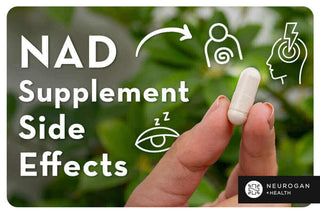Even though most NAD+ supplements are generally considered safe, there's still a chance of side effects, especially when taken in high doses or through IV therapy.
These side effects can include nausea or mild irritation, which're typically not serious. Still, it's important to understand the potential risks across different NAD supplement forms like pills, sprays, topicals, and intravenous therapy injections.
Most people opt for taking NAD+ precursors like nicotinamide adenine dinucleotide (NMN) or nicotinamide riboside (NR) over NAD supplements because these precursor compounds tend to be more shelf-stable and easier to absorb into the cells.
So, while there may not be significant side effects, the ineffectiveness of some direct NAD+ supplements could be considered a drawback.

What Side Effects to Expect from NAD Supplements?
NAD supplements are generally safe, but depending on the form they use and the dose, some people may experience mild side effects. The side effects aren't usually severe and are temporary, but they can include nausea, fatigue, or headaches.
Side Effects of NAD Pills (Capsules)
The side effects of NAD cellular pills are common with other dietary supplements, which include nausea, digestive upset, and headaches. However, most people tolerate NAD capsule supplements well as their body adjusts.
NAD+ pills or capsules are one of the most common forms of supplementation. You might be able to find pure NAD supplements, but the most popular options are precursor compounds that allow your body to convert NMN or NR into NAD+ within the cells.
To reduce the chance of side effects from NAD pills, you could take your supplements with a light meal and start with lower doses.
Side Effects of NAD IV Therapy Injection
NAD+ IV therapy might offer quicker results for elevating NAD+ levels in your blood, but it also comes with a higher risk of side effects like nausea, fatigue, and brain fog either during or after treatment.
IV therapy involves administering an NAD+ solution slowly into a vein for about a 30-minute to an hour-long session, allowing for direct absorption. This isn't something you can do at home. You'll need to visit a clinic specializing in IV treatments, and licensed practitioners must administer it.
Beyond the NAD compound itself, there are other risk factors associated with IV therapy, such as pain, bruising, and infections at the site of the injection.
While IV therapy clinics are becoming more popular as spa-like treatments for boosting supplements and healthy compound intake, they are not as accessible because of the cost and time commitment. Each session can cost upwards of $150, and to make the most of NAD+ supplementation to support a healthy aging process, you'll need multiple sessions, as the goal is to keep elevated levels of NAD in the body as you age.
Side Effects of NAD Nasal Spray
Some people might experience irritation, dryness, headaches, or a mild burning sensation in the nasal cavity after using an NAD nasal spray. If these symptoms persist, it's best to stop using this form of NAD therapy and opt for dietary supplements instead.
NAD+ nasal sprays are designed for quick and convenient absorption through the nasal membranes, making them a fast-acting alternative to pills. Nasal sprays may appeal to those who prefer a noninvasive method that delivers relatively quick results.
Side Effects of NAD Topicals
Side effects of NAD+ topicals are usually minimal, but some people may experience skin irritation, redness, or itchiness, particularly if they have sensitive skin.
These reactions are typically mild and resolve quickly. To minimize the risk of irritation, it’s recommended that you familiarize yourself with the product ingredient list to ensure it doesn't contain any allergens and patch test the product on a small area of skin before applying it more widely.
NAD+ topicals include creams, lotions, or serums applied directly to the skin. These products are typically designed to support skin health, promote cellular repair, and improve the appearance of aging skin. NAD+ topicals are absorbed through the skin, targeting localized areas rather than the whole body.
General Side Effects of Taking NAD Supplements
While NAD+ supplements come in many forms — pills, IV therapy, nasal sprays, and topicals — they don't cause people many issues. That being said, there is a rare chance people might experience some mild discomfort, which can vary depending on the delivery method.

NAD+ precursors like NMN or NR are arguably more effective than direct NAD+ supplements, and any side effects are typically minor and temporary. NMN and NR can also come in pills, capsules, gummies, or powder, making them more convenient to integrate into your lifestyle.
Before starting any NAD+ supplement regimen, it’s always a good idea to consult a healthcare professional to ensure it aligns with your health goals and needs.




